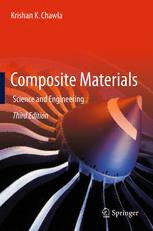Table Of ContentComposite Materials
Krishan K. Chawla
Composite Materials
Science and Engineering
Third Edition
With 278 Illustrations
KrishanK.Chawla
DepartmentofMaterialsScienceandEngineering
UniversityofAlabamaatBirmingham
Birmingham,AL35294,USA
[email protected]
ISBN978-0-387-74364-6 ISBN978-0-387-74365-3(eBook)
DOI10.1007/978-0-387-74365-3
SpringerNewYorkHeidelbergDordrechtLondon
LibraryofCongressControlNumber:2012940847
© SpringerScience+BusinessMediaNewYork2012, Corrected at 2 n d printing 2013
Thisworkissubjecttocopyright.AllrightsarereservedbythePublisher,whetherthewholeorpartof
the material is concerned, specifically the rights of translation, reprinting, reuse of illustrations,
recitation,broadcasting,reproductiononmicrofilmsorinanyotherphysicalway,andtransmissionor
informationstorageandretrieval,electronicadaptation,computersoftware,orbysimilarordissimilar
methodologynowknownorhereafterdeveloped.Exemptedfromthislegalreservationarebriefexcerpts
inconnectionwithreviewsorscholarlyanalysisormaterialsuppliedspecificallyforthepurposeofbeing
enteredandexecutedonacomputersystem,forexclusiveusebythepurchaserofthework.Duplication
ofthispublicationorpartsthereofispermittedonlyundertheprovisionsoftheCopyrightLawofthe
Publisher’s location, in its current version, and permission for use must always be obtained from
Springer.PermissionsforusemaybeobtainedthroughRightsLinkattheCopyrightClearanceCenter.
ViolationsareliabletoprosecutionundertherespectiveCopyrightLaw.
The use of general descriptive names, registered names, trademarks, service marks, etc. in this
publicationdoesnotimply,evenintheabsenceofaspecificstatement,thatsuchnamesareexempt
fromtherelevantprotectivelawsandregulationsandthereforefreeforgeneraluse.
While the advice and information in this book are believed to be true and accurate at the date of
publication,neithertheauthorsnortheeditorsnorthepublishercanacceptanylegalresponsibilityfor
anyerrorsoromissionsthatmaybemade.Thepublishermakesnowarranty,expressorimplied,with
respecttothematerialcontainedherein.
Coverillustration:Fanbladesmadeofcarbonfiber/epoxycompositeintheGEnxjetengine.[Courtesy
ofGeneralElectric.]
Printedonacid-freepaper
SpringerispartofSpringerScience+BusinessMedia(www.springer.com)
(cid:1)
A no bhadra(cid:1)h kratavo yantu vis˙vatah
˙ ˙
Letnoblethoughtscometousfromeveryside
Rigveda 1-89-i
Dedicatedaffectionately to A,K3,andN3
Preface to the Third Edition
Since the publication of the secondedition ofthis book, there has been aspateof
activity in the field of composites, in the academia as well as in the industry.
The industrial activity, in particular, has been led by the large-scale use of
composites by aerospace companies, mainly Boeing and Airbus. It would not be
faroffthemarktosaythattheextensiveuseofcarbonfiber/epoxyresincomposites
inBoeing787aircraftandafairlylargeuseofcompositesinAirbus’sA380aircraft
represent a paradigm shift. Boeing 787 has composites in the fuselage, windows,
wings, tails,stabilizers,etc.,resultingin50%incompositesbyweight.Neverthe-
less, it should be pointed out that in reality, the extensive use of composites in
aircraftisaculminationofaseriesofearlierstepsoverthedecadessincemid-1960s.
Besides the large-scale applications in the aerospace industry, there have been
impressivedevelopmentsinotherfieldssuchasautomotive,sportinggoods,super-
conductivity,etc.
Allofthisactivityhasledtoasubstantialadditionofnewmaterialinthisedition.
Among these are the following: Carbon/carbon brakes, nanocomposites, biocom-
posites, self-healing composites, self-reinforced composites, fiber/metal laminate
composites, composites for civilian aircraft, composites for aircraft jet engine,
second-generation high-temperature superconducting composites, WC/metal par-
ticulate composites, new solved examples, and new problems. In addition, I have
added a new chapter called nonconventional composites. This chapter deals with
some nonconventional composites such as nanocomposites (polymer, metal, and
ceramic matrix), self-healing composites, self-reinforced composites, biocom-
posites,andlaminatesmadeofbidimensionallayers.
Onceagain,Ipleadguiltytothechargethatthematerialcontainedinthisedition
is more than can be covered in a normal, semester-long course. The instructor of
course can cut the content to his/her requirements. I have always had the broader
aim of providing a text that is suitable as a source of reference for the practicing
researcher,scientist,andengineer.
Finally,thereisthepleasanttaskofacknowledgments.IamgratefultoNational
Science Foundation, Office of Naval Research, Federal Transit Administration,
LosAlamosNationalLaboratorySandianationalLaboratory,OakRidgeNational
vii
viii PrefacetotheThirdEdition
Laboratory, Smith International Inc., and Trelleborg, Inc. for supporting my
research work over the years, some of which is included in this text. Among the
people with whom I have had the privilege of collaborating over the years and
who have enriched my life, professional and otherwise, I would like to mention,
in alphabetical order, C.H. Barham, A.R. Boccaccini, K. Carlisle, K. Chawla,
N. Chawla, X. Deng, Z. Fang, M.E. Fine, S.G. Fishman, G. Gladysz, A. Goel,
N. Gupta, the late B. Ilschner, M. Koopman, R.R. Kulkarni, B.A. MacDonald,
A. Mortensen, B. Patel, B.R. Patterson, P.D. Portella, J.M. Rigsbee, P. Rohatgi,
H. Schneider, N.S. Stoloff, Y.-L. Shen, S. Suresh, Z.R. Xu, U. Vaidya, and
A.K.Vasudevan.ThanksareduetoKanikaChawlaandS.Patelforhelpwiththe
figuresinthisedition.Ioweaspecialdebtofgratitudetomywife,Nivi,forbeing
there all the time. Last but not least, I am ever grateful to my parents, the late
ManoharL.andSumitraChawla,fortheirguidanceandsupport.
Birmingham,AL,USA KrishanK.Chawla
March,2011
Supplementary Instructional Resources
An Instructor’s Solutions Manual containing answers to the end-of-the-chapter
exercisesandPowerPointSlidesoffiguressuitableforuseinlecturesareavailable
toinstructorswhoadoptthebookforclassroomuse.PleasevisitthebookWebpage
atwww.springer.comforthepassword-protectedmaterial.
Preface to the Second Edition
Thefirsteditionofthisbookcameoutin1987,offeringanintegratedcoverageof
the field of composite materials. I am gratified at the reception it received at the
hands of the students and faculty. The second edition follows the same format as
thefirstone,namely,awell-balancedtreatmentofmaterialsandmechanicsaspects
of composites, with due recognition of the importance of the processing.
Thesecondeditionisafullyrevised,updated,andenlargededitionofthiswidely
usedtext.Therearesomenewchapters,andothershavebeenbroughtup-to-datein
lightoftheextensiveworkdoneinthedecadesincepublicationofthefirstedition.
Many people who used the first edition as a classroom text urged me to include
somesolvedexamples.IndeferencetotheirwishesIhavedoneso.Iamsorrythatit
tookmesuchalongtimetopreparethesecondedition.Thingsarehappeningata
veryfastpaceinthefieldofcomposites,andthereisnoquestionthatalotofvery
interesting and important work has been done in the past decade or so. Out of
necessity, one must limit the amount of material to be included in a textbook.
Inspiteofthisview,ittookmemuchmoretimethanIanticipated.Inthissecond
edition,Ihaveresistedthetemptationtocoverthewholewaterfront.Sothereader
will find here an up-to-date treatment of the fundamental aspects. Even so, I do
recognizethatthematerialcontainedinthissecondeditionismorethanwhatcanbe
coveredintheclassroominasemester.Iconsiderthattobeapositiveaspectofthe
book.Thereader (student, researcher,practicingscientist/engineer) can profitably
use this as a reference text. For the person interested in digging deeper into a
particular aspect, I provide an extensive and updated list of references and
suggestedreading.
Thereremainsthepleasanttaskofthankingpeoplewhohavebeenveryhelpfuland
aconstantsourceofencouragementtomeovertheyears:M.E.Fine,S.G.Fishman,
J.C. Hurt, B. Ilschner, B.A. MacDonald, A. Mortensen, J.M. Rigsbee, P. Rohatgi,
S.Suresh,H.Schneider,N.S.Stoloff,andA.K.Vasudevan.Amongmystudentsand
post-docs, I would like to acknowledge G. Gladysz, H. Liu, and Z.R. Xu. I am
immensely grateful to my family members, Nivi, Nikhil, and Kanika. They were
ix
x PrefacetotheSecondEdition
patientandunderstandingthroughout.WithoutKanika’shelpinwordprocessingand
fixing things, this work would still be unfinished. Once again I wish to record my
gratitudetomyparents,ManoharL.ChawlaandthelateSumitraChawlaforallthey
havedoneforme!
Birmingham,AL,USA KrishanK.Chawla
February,1998

